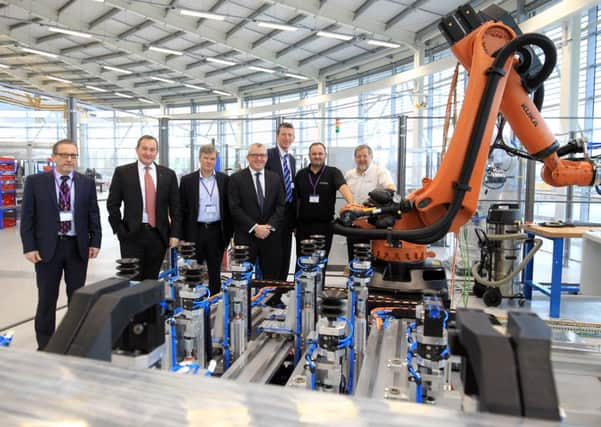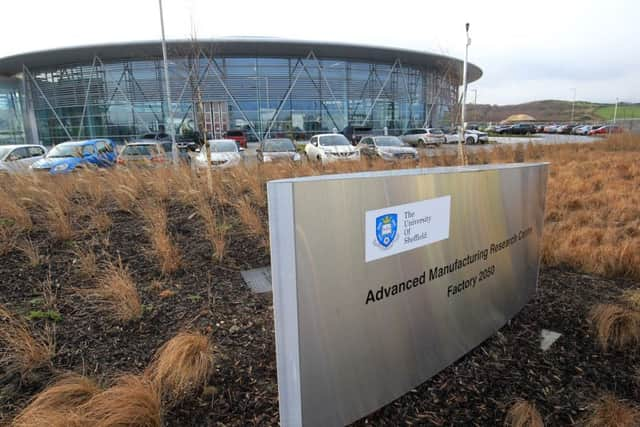MANUFACTURING DEBATE: Why productivity figures do not reveal whole story


The city is 19 per cent less productive than the national average, the Office for National Statistics claims – but the round table heard the number barely stands up to scrutiny and certainly doesn’t apply to manufacturing.
In fact, ONS figures for Yorkshire and the Humber from 2014 show the region is better than London when it comes to manufacturing productivity.


Advertisement
Hide AdAdvertisement
Hide AdStephen Shaw showed why AESSEAL is one of the best mechanical seal makers in the world.
He said: “AES is overly invested. We have spent upwards of £4m on machinery last year that we don’t need. We have 20 per cent of extra capacity in our group that we will need in two years’ time and it will need three years to get that optimised.
“It can cost five to six million pounds to buy machinery. And if you can afford it, it can take a year or two after it arrives in the factory to get the methodology completely refined so you make a product in half the time.”
David Grey said: “It’s a brave MD who says ‘let’s bet the farm on where we’ll be in three years. The customer could suddenly stop buying or change its processes. You can get very close to your customers, but you can’t get close to your customers’ customers.


Advertisement
Hide AdAdvertisement
Hide Ad“In our group we had 12 companies and in 2006 we got rid of six of them. In the sub-contract business planning is really difficult because you’re two or three steps away from what’s being decided.
Rotabroach is a world-class brand, the generic term for hole cutting. When you’ve got your own products you’ve got a lot more control.
It’s wrong to say there’s some sort of intellectual gap in this region. In a family business you run the risk of getting it wrong and you don’t have to get it wrong very badly to screw things up. Our firms have got great resilience because they are not tied to one market, they operate in every sector of the economy.”
Andy McGuinness said: “In the forge shop, a lot of the time productivity is determined by the method of manufacture. You might make 30 or 40 rings in a shift but one ring has to go back in the furnace 15 times. Improved productivity comes in doing it right and not having to rework it, but sometimes materials behave differently, therefore experience is key.”
Advertisement
Hide AdAdvertisement
Hide AdVince Middleton said: “It’s also down to volumes, if you’re making 10 of something instead of thousands.”
Mark Webber said: “We are still suffering from the period in the 80s and 90s where we thought low-cost labour was a competitive advantage. I’ve been to a factory in Dortmund where they work less and achieve more.
“The fact is we, as a nation, are under investing. The French were investing heavily 20 years ago.
David Grey said: “Is there any reason the UK can’t compete with Germany or France? We are changing our business model. When we bought Rotabroach, it was losing £250,000-a-year on £2.5m turnover. We outsourced it all to China at the quality we wanted cheaper than I could buy the material in Europe. That was 15 years ago.
Advertisement
Hide AdAdvertisement
Hide Ad“Now we’re saying let’s look at the process and do the low-cost, easier stuff there and bring the semi-finished stuff here.”
Vince Middleton said: “There are a lot of SMEs in this region at the bottom of the food chain, margins are tight and that prevents investment and that affects productivity.
“Original equipment manufacturers drive up productivity figures and so does the financial sector.
“We’re a family firm, we have had three generations, but a lot of family firms don’t manage. The first generation has the entrepreneurial spirit that set it up and you need to keep that going.
Advertisement
Hide AdAdvertisement
Hide Ad“In this region we are all micro businesses and it’s hard to think long term, step out and look 10 years ahead.”
Mike Rigby said: “We have an aerospace OEM in the North West with an eight-year order book, making the same model with same suppliers. Their biggest challenge is getting the supply chain to invest.”
Adrian France said: “We supply ships and submarines with cylinders. They need inspecting every 10 years and it can involve cutting part of the framework away.
“We have been developing on-site acoustic testing without pressure. For our customers it’s a massive reduction in downtime.
Advertisement
Hide AdAdvertisement
Hide Ad“Internally, to improve productivity, we’re looking at wearable tech, displays which can show standard operating procedures on a screen.
“We have got big pieces of machinery and our efficiency is about how quickly we can move equipment through the site, so we’re interested in robotics and handling.”
WHAT IS ADVANCED MANUFACTURING?
Advanced manufacturing is different things to different companies, but in the discussion two answers emerged: technology and efficiency.
Keith Ridgway said: “To us it’s about making a paradigm change using technology such as robotics or composites.
Advertisement
Hide AdAdvertisement
Hide Ad“Machines with a greater level of automation and control, that’s advanced manufacturing for us. Additive manufacturing was all the rage, now it’s come down the curve. I spend half my time in Scotland and it has been very badly hit by the decline in the oil and gas sector, and they might have another referendum. Industry is really struggling there.”
Mark Webber said: “We have quite traditional products and markets, in all three of our businesses we are very prone to low cost competition. We have always invested in our products and linking that with maximising the performance of the workforce is critical.”
David Grey said: “If I had to pick one word to describe advanced manufacturing it would be efficiency. It can drive up quality, reduce re-working time and costs within that of people and waste.”
Stephen Shaw said: “In our business advanced manufacturing is the difference between surviving and not. We are all facing competitive pressures. For someone that’s a batch manufacturer, direct labour costs must be no more than six per cent. The only way you can do that is to use advanced manufacturing techniques.
“‘Touch it once’ is key. In terms of direct costs, no one can make things cheaper than we can because of advanced manufacturing.”